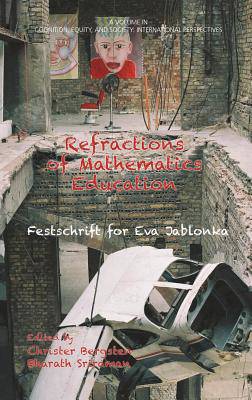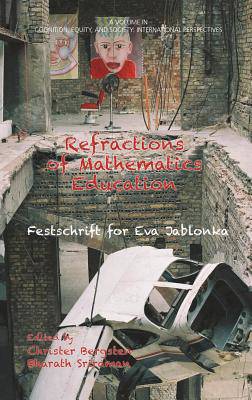
- Afhalen na 1 uur in een winkel met voorraad
- Gratis thuislevering in België vanaf € 30
- Ruim aanbod met 7 miljoen producten
- Afhalen na 1 uur in een winkel met voorraad
- Gratis thuislevering in België vanaf € 30
- Ruim aanbod met 7 miljoen producten
Zoeken
Refractions of Mathematics Education
Festschrift for Eva Jablonka (HC)
€ 152,45
+ 304 punten
Omschrijving
A Volume in Cognition, Equity & Society: International Perspectives formally known as International Perspectives on Mathematics Education - Cognition, Equity & Society Series Editor Bharath Sriraman, The University of Montana and Lyn English, Queensland University of Technology The diversity of research in mathematics education has been addressed as both, a problem and a strength. When manifested through adherence to different intellectual roots and theoretical orientations, diversions constitute 'refractions' of mathematics education. The collection and analysis of empirical data in a study are by necessity refracted through the specific analytical lens employed, as well as the aim of the study itself. Refractions can also refer to looking at old phenomena through new lenses. The chapters in this book are refracted through philosophical, political, mathematical and personal lenses by distinguished authors in the field, addressing issues about the elusive experience of doing mathematics, purification of texts, refractions, mathematics and ethnomathematics, political messages in textbook tasks, mathematics education policy debate, the political in mathematics education research, philosophy and mathematics, meanings and representations, identity of mathematical modeling, and dilemmas in the teaching of calculus. An ancient Sanskrit adage states that Knowledge is something that grows when shared, but shrinks when hoarded. Academics engaged in the generation of new Knowledge are blessed with both the time and the freedom to engage in pursuits that allow for intellectual pleasure. As a phenomenon of the Zeitgeist many have succumbed to the increased corporatization of academic work, engaging in activities for monetary and self advancement purposes. Are there any real intellectuals left in academia, a là Adorno, Bourdieu, Chomsky, Foucault, among others? This Festschrift is dedicated to academics that don't bother with self promotion or aggrandizement of themselves or their ideas in simplistic terms.
Specificaties
Betrokkenen
- Uitgeverij:
Inhoud
- Aantal bladzijden:
- 238
- Taal:
- Engels
- Reeks:
Eigenschappen
- Productcode (EAN):
- 9781681230306
- Verschijningsdatum:
- 1/05/2015
- Uitvoering:
- Hardcover
- Formaat:
- Genaaid
- Afmetingen:
- 156 mm x 234 mm
- Gewicht:
- 512 g

Alleen bij Standaard Boekhandel
+ 304 punten op je klantenkaart van Standaard Boekhandel
Beoordelingen
We publiceren alleen reviews die voldoen aan de voorwaarden voor reviews. Bekijk onze voorwaarden voor reviews.










